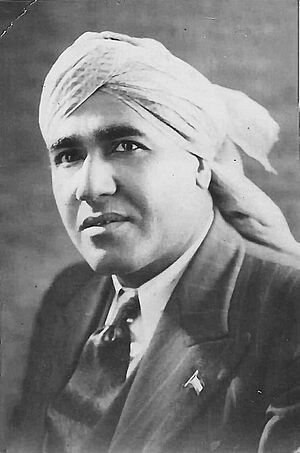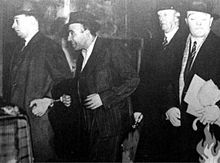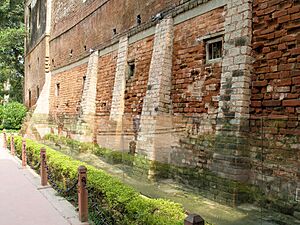Udham Singh facts for kids
Quick facts for kids
Udham Singh
|
|
|---|---|
 |
|
| Born |
Sher Singh
26 December 1899 Sunam, Punjab, British India
|
| Died | 31 July 1940 (aged 40) Pentonville Prison, London, England
|
| Cause of death | Execution by hanging |
| Nationality | Indian |
| Other names | Ram Mohammad Singh Azad, Ude Singh |
| Occupation | Revolutionary |
| Organization | Ghadar Party Hindustan Socialist Republican Association Indian Workers' Association |
| Known for | Assassinating Michael O'Dwyer in retaliation for the Jallianwala Bagh massacre |
| Movement | Indian independence movement |
| Criminal status | Executed |
| Children | 2 sons |
| Conviction(s) | Murder |
| Criminal penalty | Death |
| Details | |
| Victims | Michael O'Dwyer, 75 |
Udham Singh (born Sher Singh; 26 December 1899 – 31 July 1940) was an important Indian freedom fighter. He was part of groups like the Ghadar Party and the HSRA. He is most known for taking action against Michael O'Dwyer on 13 March 1940. O'Dwyer was a former British official in Punjab, India.
Udham Singh acted to get justice for the Jallianwala Bagh massacre in Amritsar in 1919. He was a survivor of this terrible event. After his action, Singh was found guilty and died in July 1940. While he was held, he used the name 'Ram Mohammad Singh Azad'. This name showed his respect for India's three main religions and his strong desire for freedom.
Singh is remembered as a hero of the Indian independence movement. People also call him Shaheed-i-Azam Sardar Udham Singh. "Shaheed-i-Azam" means "the great martyr." A whole district in India, Udham Singh Nagar, was named after him in 1995 to honor his memory.
Contents
Early Life and Challenges
Udham Singh was born as Sher Singh on 26 December 1899. His family lived in Pilbad, a small area in Sunam, British India. His father, Tehal Singh, was a hardworking laborer. Udham had an older brother named Sadhu.
When Udham was very young, his mother passed away. A few years later, his father also died. This left Udham and Sadhu without parents. They were then cared for by an uncle. When their uncle could not keep them, the boys went to the Central Khalsa Orphanage.
Life at the Orphanage
At the orphanage, the boys were given new names. Sadhu became "Mukta," and Sher Singh was renamed "Udham Singh." "Udham" means "the upheaval." He was often called "Ude" by his friends. Sadly, in 1917, his brother Mukta died from an illness.
Udham Singh wanted to help during the First World War. Even though he was very young, he joined the British Indian Army. He worked on railways and helped with repairs in places like Basra and Baghdad. After about a year, he returned to the orphanage in Amritsar.
The Jallianwala Bagh Massacre
On 13 April 1919, a large crowd gathered in Jallianwala Bagh, Amritsar. Over twenty thousand unarmed people were there. They came to celebrate the important Sikh festival of Baisakhi. They also wanted to peacefully protest the arrest of local leaders. Udham Singh and his friends from the orphanage were helping by giving water to the crowd.
British troops, led by Colonel Reginald Dyer, opened fire on the crowd without warning. Many hundreds of people were killed. This terrible event became known as the Amritsar Massacre or the Jallianwala Bagh massacre. Udham Singh saw this tragedy unfold.
Joining the Freedom Fight
The massacre deeply affected Udham Singh. He decided to join the fight for India's freedom. He was inspired by Bhagat Singh and his revolutionary group. In 1924, Udham Singh joined the Ghadar Party. This group worked to end British rule in India.
In 1927, Udham Singh returned to India. He brought weapons and copies of a forbidden newspaper called "Ghadr-di-Gunj" ("Voice of Revolt"). He was soon arrested for having these items and was sent to prison for five years.
After his release in 1931, the police watched Udham Singh closely. He managed to escape to Kashmir and then to Germany. In 1934, he arrived in London, England, and found work. All this time, he was planning his revenge against Michael O'Dwyer.
Action at Caxton Hall
On 13 March 1940, Michael O'Dwyer was giving a speech in Caxton Hall, London. Udham Singh got a ticket to the event. He cleverly hid a revolver inside a book by cutting out pages to fit the gun. He had bought this gun from a soldier.
When the meeting ended, Udham Singh took action. He shot O'Dwyer as he was moving towards the stage. One of the shots hit O'Dwyer, and he died almost right away. Others were also hurt in the shooting. Singh was arrested immediately, and the pistol was taken as proof.
Trial and Legacy

On 1 April 1940, Udham Singh was officially charged with O'Dwyer's murder. He was held in Brixton Prison. When asked why he did it, Singh said he had a strong reason. He felt O'Dwyer deserved it for what happened in Jallianwala Bagh. He also said he was not afraid to die for his country.
While waiting for his trial, Udham Singh went on a long hunger strike. He was later forced to eat. His trial began on 4 June 1940. He explained that he had been seeking justice for 21 years. He was happy he had completed his task.
Udham Singh was found guilty and sentenced to death. On 31 July 1940, he was hanged at Pentonville Prison.
Remembering Udham Singh
In 1974, Udham Singh's remains were brought back to India. They were cremated in his home village of Sunam. His ashes were then shared among several important places, including the Jallianwala Bagh museum.
Many things have been done to honor Udham Singh:
- A museum dedicated to him is in Amritsar, near Jallianwala Bagh.
- His childhood home in Sunam is now a museum.
- The town of Sunam was renamed 'Sunam Udham Singh Wala'.
- Several films have been made about his life, including "Sardar Udham" in 2021.
- The Udham Singh Nagar district in India is named after him.
- The day of his death, 31 July, is a public holiday in Punjab and Haryana.
- A statue of him stands at the entrance of Jallianwala Bagh in Amritsar.
Images for kids



